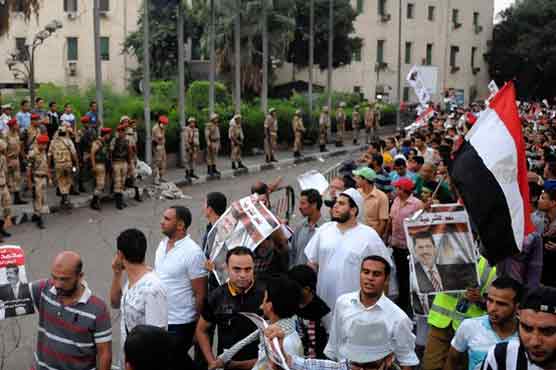Egypt: Pro-Morsi protests swell

Police used tear gas to disperse crowds of supporters of detained ex-leader Mohammed Morsi.
CAIRO (AP) Egyptian police have fired tear gas to disperse crowds of supporters of detained ex-leader Mohammed Morsi during a march in central Cairo.
Morsi supporters went to a government compound to protest at the appointment of army officers as local governors.
Local residents then clashed with the pro-Morsi crowds and both sides threw bottles and stones at each other, before security forces moved in.
The army deposed Mr Morsi in July and put in place an interim government.
Supporters of Mr Morsi, an Islamist leader who came from the Muslim Brotherhood movement, refuse to accept the new government and insist he must be reinstated.
They say the military overthrew a democratically elected government and is now attempting to entrench its power.
Opponents of Mr Morsi say he used his year in power to dismantle secular, democratic institutions in order to increase the influence of Islam.
Supporters of toppled President Mohammed Morsi increased the pressure on Egypt s interim leadership by defiantly flooding into two protest camps Monday, prompting police to postpone moving against the 6-week-old sit-ins because they feared a "massacre."
Morsi s Islamist backers have rejected negotiations with the military-backed government, leaving the most populous Arab nation in an uneasy limbo.
Still, the delay by the security forces gave the Sunni Muslim world s top religious institution more time to try to ease the political tensions with a new initiative.
Authorities also showed no signs of meeting key demands by Morsi s Muslim Brotherhood to release top Islamists who have been detained and face criminal investigations.
A judge ordered the deposed president, detained since he was overthrown July 3, to be held for 15 more days pending investigations of charges he conspired in 2011 with Palestinian militants, a judicial official said.
As news leaked that police were going to cordon off access to the sit-in sites early Monday, protesters took to the streets by the tens of thousands, and many made their way into the protest camps, whose populations include many women and children. Authorities said they wanted to "avoid bloodshed" and delayed taking any action.
The Anti-Coup Alliance, which works with the Brotherhood, said in a statement that the swift response of the people to come to the main sit-in site at the Rabaah al-Adawiya Mosque "is a great message to all parties that deserves our utmost respect."
The group also urged police not to respond to orders to blockade the sit-ins.
"Their rifles and bullets must only target enemies of Egypt," the group said.
For weeks, the government has been warning protesters to disperse, describing the sit-ins as a security threat.
The Interior Ministry has depicted the encampments as a public danger, saying 11 bodies bearing signs of torture were found near both sites. Amnesty International has also reported that anti-Morsi protesters have been captured, beaten, subjected to electric shocks or stabbed. At least eight bodies have arrived at a morgue in Cairo bearing signs of torture, the human rights group said.
Reporters Without Borders said two journalists were beaten by Morsi supporters while covering a Brotherhood march Friday in Cairo. The group also criticized "harsh measures" taken by authorities against news media supportive of the Brotherhood, saying 52 journalists were arrested since Morsi s removal from office.
Both the protesters and the security forces blame each other for using live ammunition in two major clashes near the Rabaah encampment that have killed at least 130 Morsi supporters.
Further violence threatens not only to delay the transition to a democratically-elected leadership, but could also further weaken the economy after more than two years of political instability.
The protests a main tool of expression after the closure of pro-Brotherhood TV channels have also stopped traffic and cut off main roads, and are being used by the Morsi camp as a political tool to increase pressure on the interim leadership.
After night fell Monday, speakers at the Rabaah sit-in led the flag-waving crowd in chants of "The police are thugs!" and "Islamic law, not secular law!" Some in the throng hoisted children up on their shoulders as they cheered, waved and made V-for-victory signs.
Security officials in charge of riot police units said they had been given notice Sunday to prepare their forces to cordon off the Rabaah site and another protest across town near Cairo University in Giza. Reports emerged of units coming to Cairo from around the country to take part in the operation.


